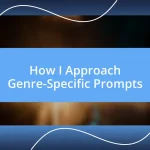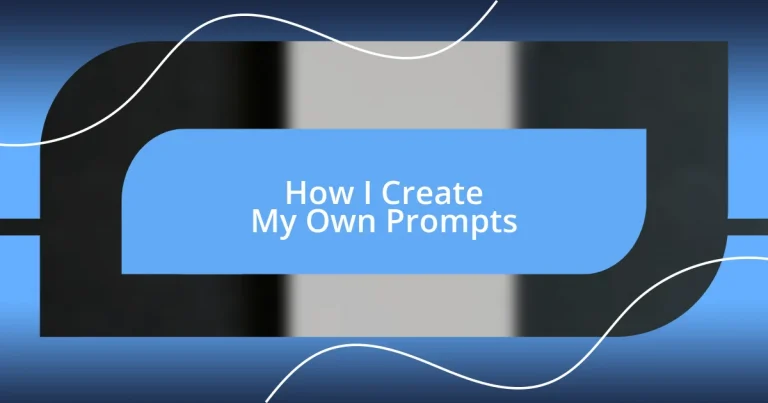Key takeaways:
- Prompts are crucial for sparking creativity and pushing writers beyond their comfort zones, transforming mundane routines into adventures.
- Identifying creative goals helps tailor prompts to enhance emotional depth, sensory description, and character development, ultimately improving writing skills.
- Establishing a consistent routine for brainstorming and refining prompts fosters creative flow, allowing for deeper exploration and richer storytelling.
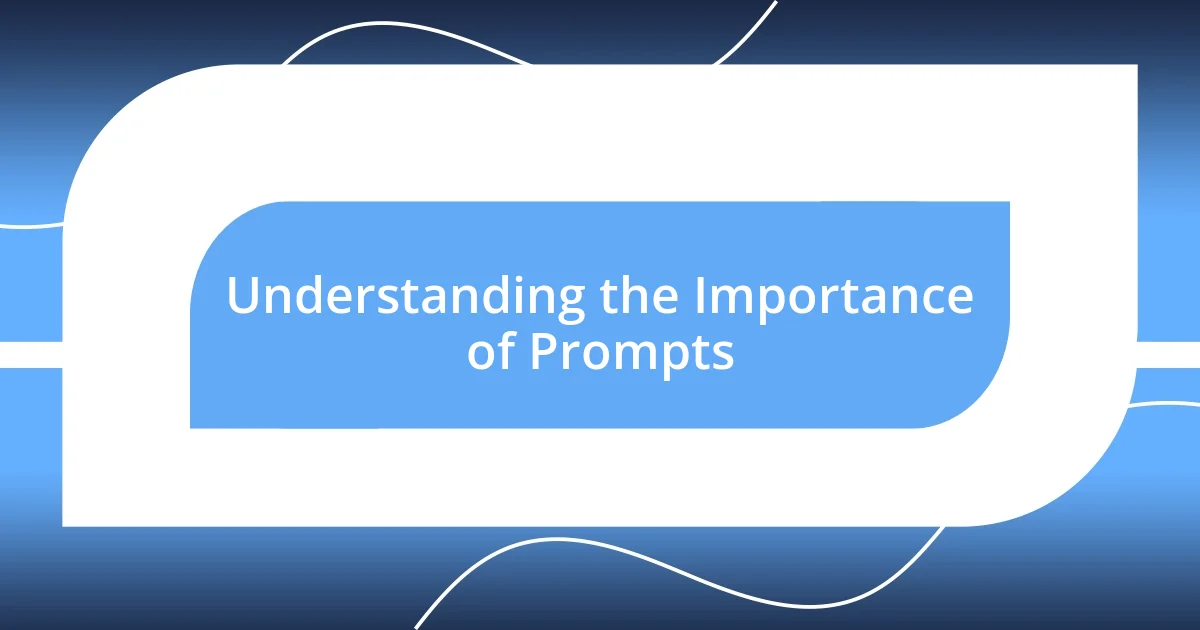
Understanding the Importance of Prompts
Prompts serve as essential catalysts for creativity, guiding our thoughts and unleashing our imagination. I still remember a time when I faced writer’s block and stumbled upon a prompt that simply asked, “What if the moon could talk?” This question ignited a flurry of ideas and led to a story I never anticipated writing. Don’t you think that sometimes all we need is a little nudge to explore the depths of our minds?
The beauty of prompts lies in their ability to challenge us and push boundaries. When I engage with a prompt, I often find myself venturing into areas I wouldn’t normally explore, which can be both exhilarating and frightening. Isn’t it amazing how a simple sentence can illuminate new pathways in our thinking? It reminds me of the thrill of discovery and that learning can occur in unexpected ways.
Moreover, prompts can transform mundane routines into vibrant adventures. I once made a habit of keeping a prompt journal, jotting down daily inspirations. It became a safe haven for my thoughts, and looking back, I realize those prompts helped shape my writing style and depth. Have you ever kept a journal? Reflecting on your evolution could offer profound insights into your own creative journey.

Identifying Your Creative Goals
Identifying your creative goals is crucial in shaping the prompts that resonate with you. I recall a time early in my writing journey when I realized I wanted to create stories that highlighted emotional connections. This understanding propelled me to craft prompts around love, loss, and friendship, directly influencing the themes I explored in my writing. Have you ever thought about what emotional threads matter most to you?
When I consider my creative goals, I often break them down into specific areas: style, subject matter, and audience. For example, I aimed to develop a more vivid description in my prose. To attain this goal, I designed prompts focused on sensory experiences, like describing a bustling market or a quiet forest. It turned out to be an exciting challenge that helped refine my writing style. What areas do you find yourself wanting to improve upon?
It’s interesting how reflecting on past experiences can shape our goals too. I remember participating in a workshop once, where feedback from peers illuminated aspects of my writing I hadn’t considered. This prompted me to set a goal of prioritizing clarity and engagement in my storytelling. The journey of identifying creative goals often requires a willingness to confront our strengths and weaknesses. Have you had a similar realization that shifted your perspective on your creative path?
| Creative Goal | Example Prompt |
|---|---|
| Emotional Depth | Write a letter to your younger self. |
| Sensory Description | Describe a day in the life of a street vendor. |
| Character Development | Create a character who faces a moral dilemma. |

Researching Effective Prompt Techniques
Researching effective prompt techniques involves diving into various sources to see what sparks creativity for others. I often find inspiration from books, blogs, and social media where writers share their own unique prompts and experiences. For instance, I stumbled upon a forum discussion where a writer shared their success with open-ended questions, leading to unexpected plot twists. That moment made me reflect on how diverse prompts can be, prompting me to explore beyond my usual styles.
- Books on Creativity: I love browsing anthologies of prompts which often include insightful introductions on how to utilize them.
- Writer Communities: Online forums and local workshops can be treasure troves of shared prompts that resonate with different experiences.
- Social Media Trends: Platforms like Instagram or Pinterest showcase visual prompts, which can ignite fresh ideas.
- Personal Reflection: Reflecting on my own writing blocks often reveals what kinds of prompts might break those barriers.
There’s something satisfying about integrating effective techniques that resonate with my personal style. I recall a particular instance where I adapted a prompt from a creative writing class so that it aligned with my desire to explore character complexities. By inviting more than one perspective into that story, I ended up crafting a richer tale that surprised even me!

Brainstorming Unique Prompt Ideas
Brainstorming unique prompt ideas can sometimes feel like searching for a hidden gem in a crowded marketplace. I remember sitting in a coffee shop, staring at the blank page in front of me. Instead of panicking, I let my surroundings inspire me. People-watching sparked images of untold stories. A woman lost in thought could be a grieving poet, while a child laughing could represent pure, unfiltered joy. Have you ever found inspiration in an everyday moment around you?
One effective approach I use is to think about “what if” scenarios. These imaginative prompts can open up endless possibilities. For example, I sat down one evening wondering, “What if animals could speak for just one day?” That single question led me to a story where pets revealed their deepest thoughts, bringing lightheartedness and depth to a narrative. It’s fascinating how a simple twist can morph into a captivating tale. What intriguing twists can you envision?
I also enjoy drawing from personal experiences and emotions to craft prompts. Recently, during a particularly challenging time, I wrote a prompt focusing on resilience. I asked myself, “What does it mean to rise after falling?” This reflection resulted in a vivid narrative about a character overcoming adversity, and it was therapeutic for me as well. Emotional connections can fuel creativity and lead to profound storytelling. Have you ever tapped into your own feelings as a wellspring for your writing?

Refining and Testing Your Prompts
Refining my prompts is where the magic truly happens. After I generate a list of ideas, I revisit them with a critical eye. I once created a prompt about a timeless love story set during a fictional war. Initially, it felt vague, but by narrowing it down to a single moment – a shared glance amid chaos – I found a richer emotional core. What was once a generic scenario became a deeply personal exploration of connection against the odds.
Testing prompts is immensely rewarding, too. My process often involves writing short pieces based on each prompt to see which ones resonate the most. I remember drafting a response to a prompt about a hidden talent, only to discover a character with a gift for storytelling. This unexpected twist not only breathed life into the piece but also revealed layers of vulnerability I hadn’t anticipated. Have you ever been surprised by where your prompts take you?
Lastly, feedback plays an essential role in refining my prompts. Sharing my work with trusted fellow writers has opened my eyes to fresh perspectives. I remember presenting a prompt about a character confronting their greatest fear. The feedback revealed that readers yearned to see how specific details, like the character’s childhood memories, could intensify the emotional impact. This input not only fine-tuned the prompt but also enriched my understanding of how to make my writing more relatable. How do you seek feedback on your prompts?
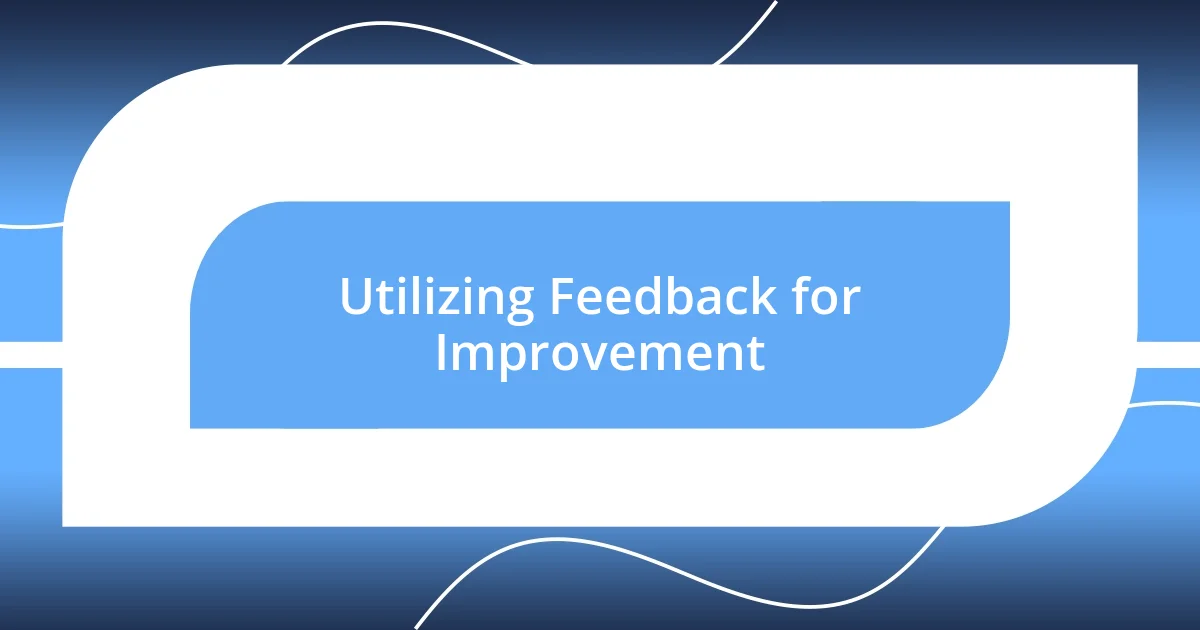
Utilizing Feedback for Improvement
I’ve always found that feedback can serve as a powerful compass in my creative journey. One time, I shared a prompt about a seemingly ordinary family dinner with a writing group. The responses surprised me; they pointed out the potential for deeper conflict and character development. This small exchange illuminated how aspects of everyday life can transform into profound narratives. Have you ever tapped into feedback that shifted your perspective on a piece?
When I incorporate feedback, I don’t just amend my work—I use it as a springboard for new ideas. After receiving constructive criticism on a prompt related to grief, I delved into my own experiences of loss. I ended up enriching the prompt to capture the complexities of healing rather than focusing solely on sadness. It was enlightening to realize how vulnerability in writing can resonate so deeply with others. Have you noticed how sharing personal stories can strengthen your prompts?
I also believe in the importance of understanding the intention behind feedback. Recently, a writer pointed out that my prompt concerning dreams felt too broad. This prompted me to narrow my focus to the dreams of specific characters, making it more relatable. By fine-tuning my approach and taking a more targeted angle, I found that readers engaged with the prompt on a more personal level. Isn’t it amazing how a slight shift in perspective can lead to richer storytelling?
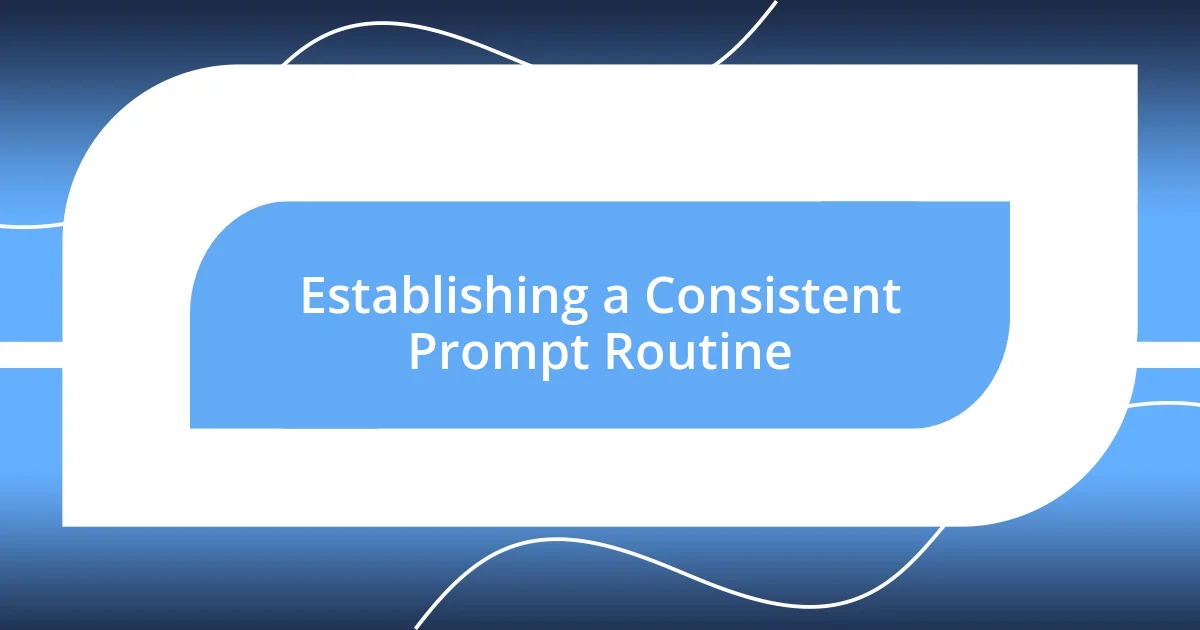
Establishing a Consistent Prompt Routine
Establishing a consistent prompt routine has been my secret weapon in the creative process. I set aside specific times each week to brainstorm and generate ideas, treating these sessions like appointments I can’t miss. There’s something wonderfully satisfying about dedicating that time to dreaming up possibilities, and it helps me stay focused. Have you ever tried scheduling creativity?
During these sessions, I often use techniques like free writing or mind mapping to unlock my ideas. One of my favorite techniques involves jotting down the first thought that comes to my mind, no matter how random. I once wrote down “beneath the old oak tree,” which sparked a whole narrative about a childhood friendship filled with secrets and adventures. It’s astonishing how a single phrase can lead to so many directions. What’s the smallest idea you’ve turned into something significant?
Additionally, consistency helps create a rhythm in my creative flow. I’ve noticed that when I stick to my routine, my brain gets into the habit of generating new ideas more freely. Every time I complete a prompt, I feel a rush of accomplishment—I often reward myself with a small treat or another creative activity. This positive reinforcement makes me look forward to my next session. Have you found a routine that fuels your creativity and makes writing feel like a rewarding journey?






